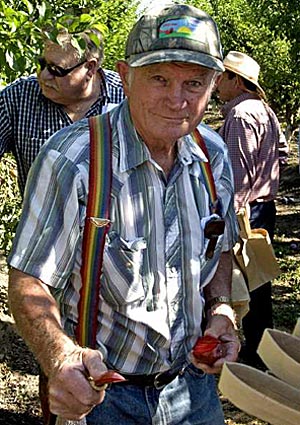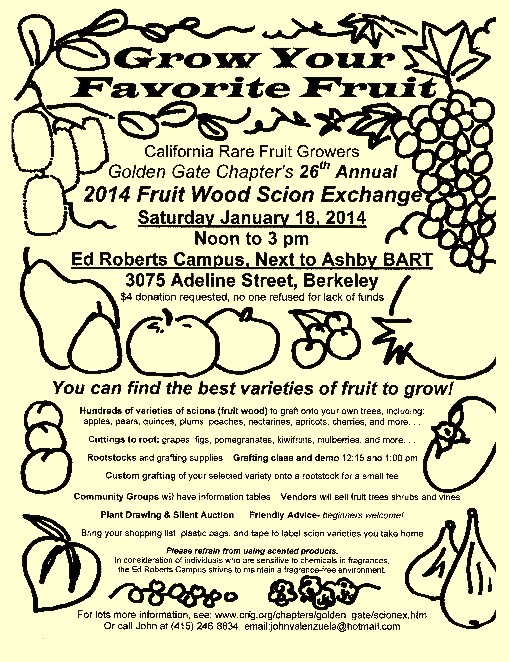Choosing the Best Fruit Tree Varieties– getting ready for Scion Exchanges and Bareroot Trees
Get ready for the Golden Gate CRFG Fruit Wood Scion Exchange this Saturday by attending this talk tonight!
Wednesday, January 15, 6:30-8:00PM
This event was a great success! Please scroll down to read the rest of this blog post–
Choosing the Best Fruit Tree Varieties: Preparing for Bareroot Season and Scion Exchanges
with John Valenzuela
At ‘Pollinate Farm and Garden’ in Fruitvale, Oakland
Sliding scale $10-25; no one turned away for lack of funds
register here: http://www.brownpapertickets.com/event/556133
Get ready for this season of bare root fruit trees, and more fruit wood scion exchanges, by getting your fruit tree ‘shopping list’ together for this season. I hope you were taking notes at all those fruit tastings I announced this last summer! In addition to taste, I will also share other considerations about various fruit varieties, including adaptability to various climates, pollination needs, seasonality of harvest, uses in processing, historical considerations, and more. Pollinate Farm and Garden is a great new urban farm supply store that is hosting a great series of workshops. My talk will be the first of this year! Check them out: http://pollinatefarm.com/event/
Later in the season I will also lead a grafting class at Pollinate, so stay tuned!

Pollinate Farm & Garden
2727 Fruitvale Avenue
Oakland, CA 94601
Phone: 510.686 DIY FOOD (3493)
Hours:
Wed – Sat 10:00-6:00
Sun Noon-5:00
2014 CRFG Scion Exchanges in full swing-
While it may be so dry we are needing to irrigate, there are some things that assure us that it is indeed winter. The scions have been cut from the California Rare Fruit Growers scion orchards of favored heritage varieties carefully maintained to preserve hundreds of unique varieties. This diversity of fruit varieties come from many regions from around the world, North America, in addition to local varieties from California, and even right here in the S.F. Bay Area. Even some modern varieties found in supermarkets might also be considered ‘rare’ fruits. Unless you have picked tree ripened plum or peach from your own backyard tree grown in healthy soil, you may never have really tasted these ‘common’ varieties at their prime of maturity and ripeness.
What is a ‘scion’?
Scions are the tips of fruit tree branches used for making new trees, just the same as the original. This vegetative or asexual fruit tree propagation is done by rooting these cuttings, or if that is too difficult, by grafting – joining the scion to a rootstock of a compatible tree. Seedlings may be good for genetic diversity and discovering new varieties, but some species only make one out of a thousand trees worth eating fruit from. If you want a fruit tree that is exactly what you know you like, and that will come into bearing sooner than a seedling, vegetative propagation is the way to go. Come to our big Fruit Wood Scion Exchange this Saturday to learn more, and gain access to hundreds of varieties that are grown by the California Rare Fruit Growers in the Bay Area. The Santa Clara Valley Chapter and Monterey Chapters have already held their exchanges this year, and the Golden Gate chapter is next!
http://www.crfg.org/chapters/golden_gate/scionex.htm
check out the video page too: http://www.crfg.org/chapters/golden_gate/scionex_videos.htm
More scion exchanges in Northern California here:
http://www.crfg.org/chapters/golden_gate/other_2014_scion_exchanges.html
Protect the rights of fruit tree breeders!
A reminder: We do not allow any patented varieties at out scion exchange events.
Some patented varieties of fruit you may recognize are: ‘Zestar’ Apple, ‘Pinova’ Apple, ‘Skeena’ Cherry, ‘Minnie Royal’ Cherry, ‘Royal Lee’ Cherry, ‘Sequoia’ Fig, ‘Jupiter’ Seedless Grape, ‘Neptune’ Seedless Grape, ‘Cotton-N-Candy’ Interspecific, ‘Emarald Beaut’ Plum, ‘UFO’ White Peach, ‘Harrow Sweet’ Pear, ‘Angel Red’ Pomegranate, and about 1,600 more varieties.
Luther Burbank died with limited financial benefit from all the varieties he bred because he did not enjoy the protection of plant patents. Though he supported the protections plant patents would provide, it was just a few years after he died did the Federal Plant Variety Patent Legislation get passed into law.
The following is quoted from the US Patent and Trademark Office (USPTO):
http://www.uspto.gov/web/offices/pac/plant/#1
“What is a plant patent?
A plant patent is granted by the Government to an inventor (or the inventor’s heirs or assigns) who has invented or discovered and asexually reproduced a distinct and new variety of plant, other than a tuber propagated plant or a plant found in an uncultivated state. The grant, which lasts for 20 years from the date of filing the application, protects the inventor’s right to exclude others from asexually reproducing, selling, or using the plant so reproduced. This protection is limited to a plant in its ordinary meaning:”
All the patented plant varieties can be found on the USPTO website search engine:
http://patft.uspto.gov/netahtml/PTO/search-bool.html
A spreadsheet with all patented varieties as of Jan 2012 is found here, thanks to Jason Sutor: https://spreadsheets.google.com/pub?key=0AqoBKzfSt0AudHRmZmk2LWVqUHNrMjJwS29fYWpGenc&hl=en&output=html

Let’s respect and reward fruit breeders work!.
Floyd Zaiger was Trained by Nectarine Breeder Fred Anderson, who was trained by Luther Burbank
We respect the rights of the breeders who hold these patents. Plant patents do not last forever. They do eventually expire, 20 years from the filing of the patent application. They are then in the public domain, and are free to share. Thanks to the hard work of fruit breeders from Zaiger Genetics, University of Minnesota, Armstrong Nursery, and many, many others; we may consider these great modern varieties ‘future heirloom’ fruits.
Some varieties with expired patents are:
‘Red Baron’ Peach,
‘Champagne’ White Peach,
‘August Glo’ Nectarine,
‘Arctic Snow’ White Nectarine,
‘Arctic Queen’ White Nectarine,
‘Flavor Supreme’ (PlumXPlum Cot),
‘Flavor Queen’ (PlumXPlum Cot),
‘Flavor King’ (PlumXPlum Cot)
‘Janice’ Fig
‘Ginger Gold’ Apple,
‘Honeycrisp’ Apple,
‘Cameo’ Apple
‘Enterprise’ Apple
‘Goldrush’ Apple
‘Cripps- Two’ Apple aka Sundowner®
‘Cripps Pink’ Apple (which also has another trademarked brand name: Pink Lady®)
Trademarked names are a separate issue. Trademarks are brand names used for certain varieties, with the mark ® if federally registered (renewable every 10 years), or with the ™ if the trademarked is just claimed.
For more on trademarks and patents see this article, from Oregon State: http://extension.oregonstate.edu/gardening/what-does-it-mean-when-nursery-plants-are-patented-or-trademarked From a couple of nurseries, more on the confusion multiple names for varieties causes: short article- http://www.lazyssfarm.com/Inquiring%20Minds/trademarked_plants.htm , and a longer article-
http://www.plantdelights.com/Article-Trademarks-in-Horticulture
Collect scions while you prune your fruit trees.
For some tips on how to prepare scions to bring to the exchange see some of our videos on preparing for the exchange, here:
http://www.crfg.org/chapters/golden_gate/scionex_videos.htm
Pruning classes abound in the Bay Area: at Berkely Hort. Nursery, Berkeley Youth Alternatives, the Institute of Urban Homesteading, and other venues.
Please consider joining me at the Berkeley Eco-House backyard food forest for a pruning class, Sunday, Feb. 2nd. More info here:
http://ecologycenter.org/events/winter-fruit-tree-pruning-theory-demonstration-and-hands-on-practice/
One more class to mention:
The Marin Master Gardeners will host me presenting the talk: “Fruit Tree Diseases and Pests in the Home Orchard”. The program is February 26, 2014, 12pm-1pm at the Boro/Pickleweed Community Center in San Rafael. Hope to see you there-
Please let me know if you need advice regarding your fruit trees, or need any pruning or grafting this season.
See you at the exchanges! Or maybe at that cherimoya tasting in So Cal.
JV


